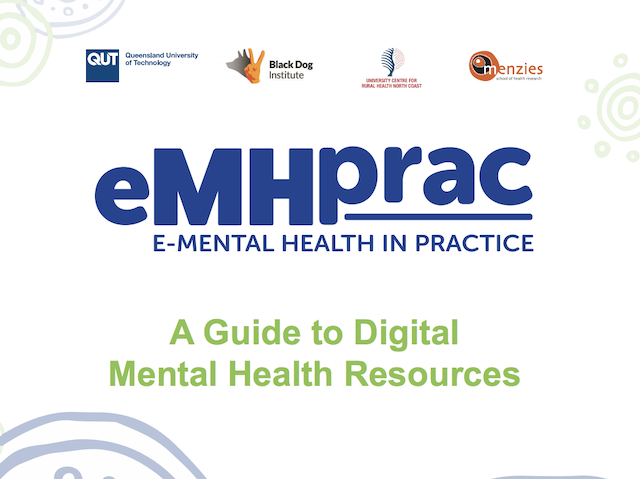
eMHPrac
Business / Practice Details
Business / Provider Type
Education Provider
Services Offered
Education
Profile
Business / Provider Profile
The eMHPrac (e-Mental Health in Practice) Project is funded by the Australian Government and aims to raise health practitioner awareness and knowledge of Digital Mental Health. eMHPrac provide free training and support in its use to GP's, allied health professionals and service providers working with Aboriginal and Torres Strait Islander people.
The eMHPrac objectives are to engage health professionals in use of e-mental health by:
Increasing awareness, knowledge and positive attitudes
Building confidence and self-efficacy
Provision of training in use of e-mental health
Provision of workforce support in the use of e-mental health
Provision of advice to the government on the most effective ways to support e-mental health
eMHPrac focuses on e-mental health promotion, training and support with:
General Practitioners - Led by Black Dog Institute
Allied Health Practitioners - Led by Queensland University of Technology
Including psychologists, social workers, occupational therapists, mental health nurses and practice nurses.
Service Providers working with Aboriginal and Torres Strait Islander people in:
Northern Territory and Western Australia - led by Menzies School of Health Research
Northern NSW - led by University Centre for Rural Health (North Coast, The University of Sydney)
Far North Queensland - led by Queensland University of Technology
What are digital mental health programs?
Digital Mental health (e-mental health) are services, programs or applications, delivered via online, mobile or phone based platforms. They may be self-driven or practitioner guided and can be used alone or in combination with face-to-face therapy.
Benefits of e-mental health programs
For many people with mental health problems such as depression and anxiety, online intervention programs can be as effective as face-to-face treatment, particularly if there is additional practitioner support (Griffith et al., 2010; Andersson & Hedman, 2013; Andrews et al., 2014).
The eMHPrac objectives are to engage health professionals in use of e-mental health by:
Increasing awareness, knowledge and positive attitudes
Building confidence and self-efficacy
Provision of training in use of e-mental health
Provision of workforce support in the use of e-mental health
Provision of advice to the government on the most effective ways to support e-mental health
eMHPrac focuses on e-mental health promotion, training and support with:
General Practitioners - Led by Black Dog Institute
Allied Health Practitioners - Led by Queensland University of Technology
Including psychologists, social workers, occupational therapists, mental health nurses and practice nurses.
Service Providers working with Aboriginal and Torres Strait Islander people in:
Northern Territory and Western Australia - led by Menzies School of Health Research
Northern NSW - led by University Centre for Rural Health (North Coast, The University of Sydney)
Far North Queensland - led by Queensland University of Technology
What are digital mental health programs?
Digital Mental health (e-mental health) are services, programs or applications, delivered via online, mobile or phone based platforms. They may be self-driven or practitioner guided and can be used alone or in combination with face-to-face therapy.
Benefits of e-mental health programs
For many people with mental health problems such as depression and anxiety, online intervention programs can be as effective as face-to-face treatment, particularly if there is additional practitioner support (Griffith et al., 2010; Andersson & Hedman, 2013; Andrews et al., 2014).
Why us
Digital mental health programs, applications and services can be self-directed or therapist guided providing access to mental health information and support from any place, at any time. They can be a useful prevention and early intervention strategy. In addition, they can also be utilised to provide support prior to engaging a mental health professional, as an accompaniment o traditional therapy, or as an assessment or monitoring tool within therapy.
Digital mental health treatment programs are easy to use and don't require special skills. They can be used anonymously, are easy to access and most are free of charge. Practitioners can choose their level of involvement in their patient's use of these programs - from simply encouraging and monitoring their progress, to guiding, acting as a coach or explaining content. Some online services (Mindspot, THIS WAY UP and Mental Health Online) also offer program-based guidance and coaching.
Digital mental health treatment programs are easy to use and don't require special skills. They can be used anonymously, are easy to access and most are free of charge. Practitioners can choose their level of involvement in their patient's use of these programs - from simply encouraging and monitoring their progress, to guiding, acting as a coach or explaining content. Some online services (Mindspot, THIS WAY UP and Mental Health Online) also offer program-based guidance and coaching.
Claim this profile to receive referrals from this page.
0 Follower(s)



